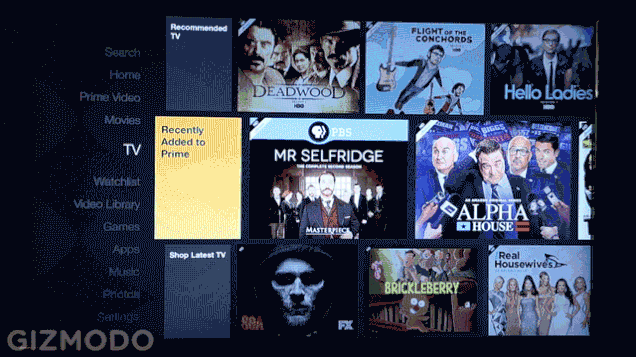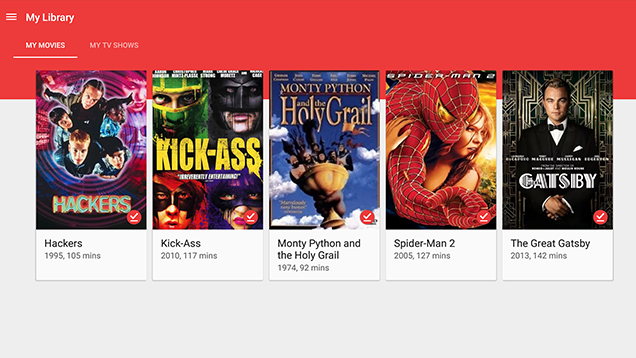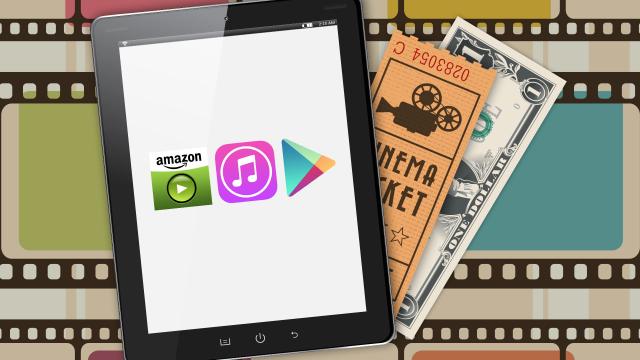Today, Star Wars gets re-released yet again. This time, it’s coming to iTunes, Google Play, Quickflix and EzyFlix. Whether or not you’ve already bought this specific collection a dozen times, digital libraries aren’t going away. But is it worth buying from them?
Photo by Maria Morri
There is no shortage of ways to purchase a movie these days. However, conventional wisdom has typically suggested that buying a movie from an online library to gain streaming rights isn’t the best idea. Before we talk about why it might be OK to get an online version, it’s only fair to go over the common objections:
- You don’t really own it: When you buy a DVD or Blu-ray, you own it. It stays inside your house, you can watch it as much as you want, and you won’t have to pay again for access later on. With digital libraries, your access can be revoked.
- Big companies (and their servers) can fail: When you buy a movie from a streaming service, you can stream it from their servers as much as you want. But what if those servers go down? Tech companies shutter services all the time and there’s no knowing when a company will go out of business. You only get those movies for as long as those companies are capable and willing to provide it to you.
- You need an internet connection just to watch your library: For decades, if you bought a VHS tape, DVD or Blu-ray, you could watch your movie without the internet. Now, if your internet connection dies, your entire media library is gone. Worse yet, if you have a slow connection, that HD film starts looking like it was shot in Potat-O-Vision.
- You can get digital version free with discs anyway: Many (though not all) hardcopy movies come with free “digital” copies. Unlock codes can give you access to films on sites like iTunes or UltraViolet. If you can have both, why spend $20or more on just one?
Of course, everyone will have their own objections, but these are some of the most common, and they’re all valid concerns. However, in our rush to poke holes in the digital library method, we may have overlooked a few things. For the sake of this discussion, we’re going to assume that it’s worth paying for media under fair circumstances.
Digital Movies Are More Convenient Than Ever

There was a time when buying a movie on iTunes meant that you could watch it on your computer, maybe your iPod and that was about it. However, that only covers a small portion of use cases. Most of us want to watch movies on the couch in our living room, on a tablet, or even our phones.
Today, that’s more possible than ever. Personally, I have a heavy foothold in the Google ecosystem, which means I have an Android phone, tablet, Chromecast, and web browser where I may want to watch a movie. One movie purchase to the Google Play Store means that I can watch that film on any of those screens. If I were to go out and buy the Blu-ray of that movie, I would have to rip it to my computer, add it to my own media server, and take responsibility for making sure that computer always has an internet connection with sufficient upload speed. Or I could format the file to be optimised for playback on my phone and take up space on my internal storage, which is even more cumbersome.
Now, to be fair, that process is simpler than ever. But it also means that if you want to watch your movies on any device besides a dedicated player, you have a lot of extra work to do. Work that’s technically illegal, by the way. While few around these parts have a serious moral quarrel with ripping movies you bought, it does mean you have fewer easy options since the software to do it is also illegal. Put another way, you’re not going to be able to rip a Blu-ray with iTunes any time soon.
If you want to pay money to have “permanent” (we’ll come back to that) access to a movie, you don’t really have a more convenient option than buying from an online library. In fact, the only real hangup is matching your ecosystem. Google has had to work out some sneaky backdoor shenanigans to get Play Movies onto Apple TV. But if you have a fairly consistent set of devices, you shouldn’t have too many problems.
Digital Libraries Are Way Nicer

If you have a collection of Blu-ray discs, they have to take up shelf space. They have to be packed up in boxes. If you rip your movies, they fill up your hard drive. You can set up your collection in a browsing-friendly way, but most people tend to arrange their movies in a spine-out way, which means any guests who want to see what films you have available will have to bend their neck 90 degrees to the right to get a good view.
Simply put, digital libraries look way cooler. You can see cover art, explore descriptions, browse through your selection with a phone or tablet. You can watch trailers and even get info on actors or soundtracks while you watch. Blu-ray players have some of these features, but they also come with a bunch of extra junk. Most Blu-ray movies have a lot of trailers and unskippable content crammed onto the front end, and loading times are atrocious.
This shouldn’t be big news to us. Part of the reason for Netflix’s popularity is that it gives us a good-looking digital library that can stream movies on-demand with no unskippable trailers or other junk. Digital libraries like Google Play are much closer to Netflix than they are to the experience of Blu-rays and this is a good thing.
“Owning” Media is Something Of A Myth

Most of us don’t like to think about it, but we rarely “own” a movie when we buy it, no matter the source. When you buy a disc from the store, legally, you’re purchasing a licence to watch the movie in your home. This is a licence that’s controlled by digital rights management tools. Blu-ray discs in particular have some of the most complicated, over-engineered DRM of any medium out there.
Most of the time, this isn’t a problem with a licensed Blu-ray player. However, Blu-rays often require updates in order to keep their DRM functioning. New discs ship with updates to the DRM, as well as revocation lists that can disable certain models or lineups of players until they receive security updates. What this means is that it’s possible to buy a new Blu-ray, put it in an old player, and wind up locked out of that movie, or potentially all of your movies, depending on what rights the new disc revokes.
This famously happened in 2010 on a semi-large scale when some legitimate consumers tried to watch Avatar and got locked out. Not everyone was affected, but a bug in the system resulted in some users getting the shaft. Every once in a while, someone bumps into an issue where the software between the player and the disc doesn’t agree and an update is required.
However, this raises a key issue. Requiring software updates for Blu-ray players isn’t much better than storing your movies on a remote server. Both can go down some day. As long as your Blu-ray player is up to date, you shouldn’t have anything to worry about, but you’re still running the risk of buying into an ecosystem where your rights can possible be revoked down the line (whether intentionally or unintentionally).
Of course, this doesn’t mean that you can’t trust Blu-rays. Often when we discuss “owning” media, it’s implied that if there’s a risk of losing access to something years down the road, then it’s not worth buying it at all. This couldn’t be further from the truth. Plenty of people bought VHS tapes and now, even if you still have a working VHS player, the cassettes will wear down over time and the quality is crap. Part of buying new media is paying for the tech upgrade, not just the movie licence. Whether it’s a cynical cash grab or just the nature of how technology progresses, wanting to pay once for a movie forever is an unrealistic expectation. Even if we’d all like it to be.
Digital Libraries Aren’t Perfect, But Nothing Is
None of this is to say that streaming digital movies is perfect. $20 is still $20, and even if that’s a normal price for a new movie, there are more and more cheaper ways to watch movies with each passing year. If you don’t want to pay the premium, it would be hard to blame you.
However, some people (myself included) still like buying films. Personally, I’ve always wanted to buy discs because I like how they look on a shelf. It’s like a movie aficionado’s version of having many leather-bound books in your home. However, as time went on, I discovered that watching my movie collection became a hassle. Half the Blu-ray players I’ve ever owned are slow, unreliable, or complain about updates every time I try to watch a movie on them. And even in 2015, there is still no free software for watching Blu-rays on my computer.
However, digital movies from online stores are an attractive option. You can play them on just about any device, the library apps are a nicer experience, and best of all, you don’t get locked out of your movies because you didn’t update your toaster. And if you’re worried about your library disappearing, don’t fret. We’ll all be paying for new 16KHD Holographic versions of Star Wars long before Apple or Google go out of business and shut down their movie servers.

Comments
2 responses to “Why It’s OK To Buy Digital Movies”
So why can’t we just have a downloadable mp4 as an option to purchase – much like the music industry and mp3 from itunes/amazon etc? Why does it have to be streaming or riddled with DRM for digital consumption? If people want to pirate it, they’re gonna pirate it. DRM does nothing but hurt legitimate customers.
Where are the articles asking why there is no drm free variant that actually competes with illegitimate copies?
EDIT: Why is this waiting for moderation?
Exactly, why is a movie special? A movie and a music CD cost about the same amount. Why are movies treated differently? Because people put up with it. Apple only switched to DRM free mp3s because that is what people wanted. Unfortunely people seem content with just streaming/hiring movies 🙁
I’m always amazed at how much is lost in the transition from one recording medium to the next. So many LPs that never made it to CD, so many CDs that never made it to digital. Likewise with VHS > DVD / BluRay > digital. DRM seems to make it less likely that some content will survive as the rights get so firmly tied to a particular region or whatever that content which was more widespread on LP/CD/VHS is now restricted to a particular market. Foreign movies which were once available on VHS with subtitles are now no longer (officially) available with newer mediums.
I have a large DVD / BluRay collection but rarely buy digital movies (I have about 15 from memory and in almost every case I bought it because it was a really good deal, or even a freebie). I do get nervous about buying a movie and then losing it though. Music now is DRM free so that’s easy, books are easy to de-DRM and store offline (I don’t trust Amazon one tiny bit but they do sell books cheap!).
The convenience of buying from Google (for me, a multi-Android-device user) is huge – far more than iTunes which has massive restrictions on when, where and how you can view its content. But the risk of ‘losing’ that content over-shadows that convenience.
It would be nice to know that there was some guarantee about digital movies but there is none. For that reason, I don’t see a time in the near future when I would buy digitally instead of on physical media.
“$20 is still $20”.
Except when it isn’t.
That’s one subscription, which doesn’t include costs for internet access, pay-per-play or outright purchases.
Buying a digital movie is typically $10. You can get Blu-rays for that price or not much more these days.
And if you’re into obscure, cult, foreign, forget it. The digital range is latest Hollywood blockbusters only.
Oh, and then there’s the dead computer/gadget crisis.
I’m on my third computer. If I’d downloaded movies to my 2 deceased ones, they’d be lost, unless I copied them (illegal and “extra work”).
If Blu-ray/DVD player dies, no problem. Discs still playable on new machine.
BTW, there’s no “licence to watch the movie in your home”. That DVD/file is *your* property. The only limits are those specifically prohibited by law (copying, public performance).
I bit the bullet and went digital. But the thing that sh*ts me is that I invested in the iTunes Store (because I prefer the Apple ecosystem and felt comfortable taking that risk) yet many obvious/popular titles are still not available there. I’m talking titles that are definitely available on DVD/Blu-Ray. Example: Donnie Darko. Mulholland Drive. These are movies a guy wants in his collection! Hello, iTunes? Hello?
So my movie collection has to either be fragmented (eg. here’s some of them on iTunes, and over here are the ones I had to buy on Google Play, and here are the ones that were only available on Amazon, etc) or with GAPING HOLES!. Nobody wants that. Nobody.
Exactly. AGAIN. i sunk BUCKETLOADS into apple music. Thought that one day i could just rip em all to CD and let god sort them out. No dice. NO tag data follows any of apple’s proprietary music files. This means that now i have three hundred plus tracks titled ‘track_01’, etc. Ad infinitum.
in Australia our copy-write laws allow us the right to keep backup copies of all digital media this includes blu-Ray DVD and CDs to be used in place of or in case your original copy is damaged.
I intend to exercise that right.
Your VHS analogy is pretty week people like myself who collect movies replaced the Betacord and VHS videos with DVD versions as they became available and not because the tapes were worn they were fine it was getting to expensive to get the players repaired and in most cases it was a trade up to a remastered wide screen version of the film. Yeah I’ve done the Foxtel thing and I have a Netflix account and even though they all toute HD but their not.. It’s adaptive streaming which only give you an interpretation of HD down to Sh*tD (the picture looks like it out of focus because the compression ratio on the stream is too high) don’t get me wrong it’s a great stand by when there Is nothing but reality crap on free to air. But watching your favourite films or a new release, I’m sorry I want the full cimenatic effect not the streamed crap they pass off as HD and I don’t understand why I need to be connected to the Internet to do it.. That’s just market research bullcrap it won’t stop piracy or make the expirience better in anyway shape or form ..you people are so gullible.
Just sell me a hard copy I can rip to a file or straight up sell me a soft version at a fair price that I can play on a device of my choosing without having to install icrud and Google crapcast to play it or piss off and don’t waste my time. As long as I’m not reselling it or trying make money from my copy we shouldn’t have any issue.
Oh and by the way I own a number of stand alone blue Ray and DVDs players… Software update?? Never had to do one and have never had an issue. And if I did I would replace it as they are dirt cheap these days for example I picked up a new Samsung blue ray player 12 months ago for $60 … Dirt cheap.. Wouldn’t even bother with a firmware update. I would just replace it.